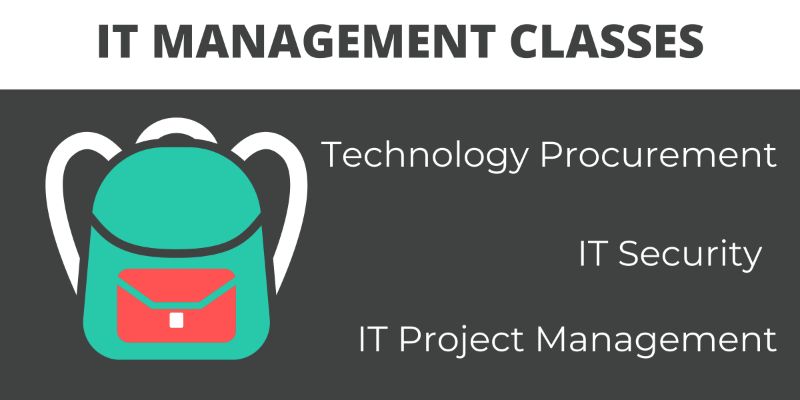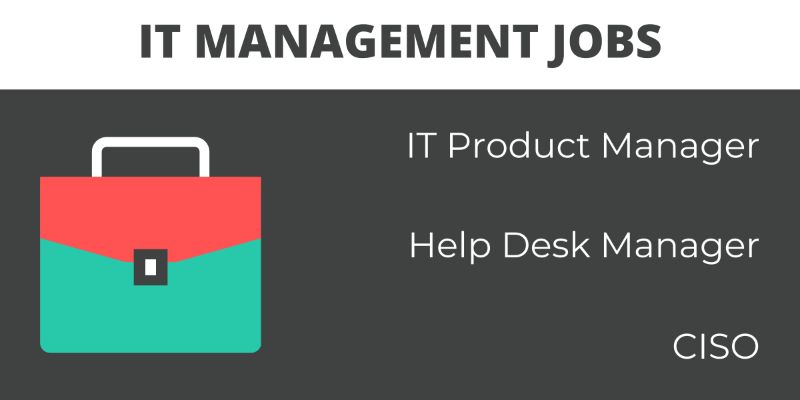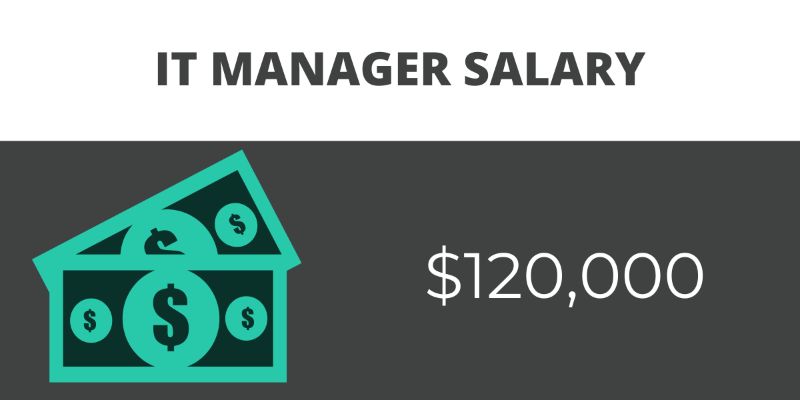Information technology is at the heart of what keeps most organizations running these days. As opposed to computer science, information technology is focused on how to properly utilize hardware and computing tools to meet specific organizational objectives. In an era in which nearly all business occurs at least partially online, our economic engines would come to a grinding halt without information technology support.
Additionally, think of nearly every large governmental organization. Think of hospitals, public school systems, the military, NASA. Each requires extremely robust IT support to function at their best. And for each team that requires IT support, quality management is needed.

The field of IT management assumes an individual has or is willing to know topical IT knowledge. But it doesn’t stop there. You likely have first hand experience or have at least seen the trope in pop culture where a technical individual gets ‘stuck in the weeds’ when talking to a non-technical crowd. Management of IT helps to bridge this gap, ensuring individuals who are highly skilled at information technology-related concerns can effectively provide their services to support the work of non-technical colleagues. This involves understanding both the broader organizational goals, strategic perspectives, how to manage your own team, and how to push for proper IT implementation.
While this may seem like a lot to consider when you’re starting your education, for the right individuals who have interest or experience in IT, people skills, and are strategic thinkers, IT management can be a lucrative and meaningful career path.
We’ve covered many degree types at GreatBusinessSchools and aim to use our years of higher education research and career advice to provide the highest quality guides for future students.
In this guide we’ll work through the following topics:
- What Topics Will I Study With an IT Management Degree?
- What IT Management Degrees Are Available?
- What Jobs Can I Gain With an IT Management Degree?
- What Are The Best Certifications in IT Management
Not seeing what you’re looking for? Be sure to check out our related content below:
- The Best Online Cyber Security MBA Programs
- The Fastest Cyber Security MBA Programs
- The Most Affordable Master’s in Entrepreneurship Degrees
- The Most Affordable Master’s in Business Intelligence and Analytics
- The Fastest Master’s in Business Intelligence and Analytics
What Topics Will I Study With an IT Management Degree?

The topics in IT management degrees vary to some extent depending on the degree level you’re pursuing. Additionally, some programs expect applications to have prior experience with IT and don’t actually cover IT topics directly. On the other hand, a wider range of programs provide some coursework in both the technical aspects of IT as well as management and business.
A sample of courses you may find available in an IT management curriculum includes the following:
System Analysis For Information Technology focuses on a set of tasks IT managers will need to be acutely aware of. System analysis involves the choosing of and strategizing about information systems so as to best support organizational objectives. Additionally, system analysis more broadly speaking deals in the design, implementation, documentation, and maintenance of systems. So what types of systems are we talking about? In this sense, systems that an IT manager may need to consider include operating systems, what forms of databases to use, risk analysis of different system types, information security of system choices, what networking systems will be required, and what hardware a given system will need to operate.
IT Operations Management provides the building blocks for managing ongoing, emerging, and future IT operations to support organizational objectives. A range of skills are often covered in this type of course, including processes to identify emerging technology trends, processes for comparing and choosing the proper IT components for new projects, how to secure backing and funding for IT updates and projects, and how to set up systems to maintain IT operations.
Information Security For IT Managers centers around best practices that should be implemented to avoid data breaches, unnecessary risk of data assets, and offensive infosec intrusions into your IT operations. Data breaches are some of the most costly and disruptive incidents that can occur to many organizations, and IT managers are at the forefront of ensuring proper infrastructure and protocols are in place to prevent these events.
Infrastructure and Hardware courses tend to provide frameworks through which you can best determine the proper infrastructure and hardware needs for your IT team. Choosing infrastructure and hardware can have massive implications for IT system performance, the ability to future proof an org, as well as pricing and maintenance. As a future leader of the IT portion of your organization, you’ll need to be able to lead efforts to upgrade, future proof, and procure the right infrastructure and hardware.

IT Project Management Tools helps to equip individuals with up-to-date methodologies and tool sets for project management. There are a wide variety of trending project management methodologies which each offer certifications and the ability to prove levels of competency. Depending on the future organization you would like to enter, a course such as IT project management tools can help you to prep for becoming certified at this PM technique, boosting desirability and PM skills.
Contracts, vendors, and strategic planning helps future IT managers to think strategically about practical concerns regarding new IT projects, upgrading IT, and navigating an organizational landscape as an IT-centered leader. Particularly in enterprise environments or large organizations, contracts and vendors for IT solutions can be great opportunities to gain aid upgrading your infrastructure. On the other hand, poorly negotiated contracts and the wrong vendors can be very costly mistakes. Learn what metrics are commonly used to track and negotiate 3rd party vendor contracts in courses such as this.
Leadership and teambuilding courses often don’t have an IT focus, but can draw from other knowledgeable faculty from within business or management schools at a university. Students wishing to focus more on leadership, innovation, or general management often have the option to take a greater proportion of courses related to general management topics like this within their program. This can be a good choice for individuals who already have IT know-how or who are seeking to advance higher in management.
Not seeing what you’re looking for? Be sure to check out our related content below:
- The Best Online Cyber Security MBA Programs
- The Fastest Cyber Security MBA Programs
- The Most Affordable Master’s in Entrepreneurship Degrees
- The Most Affordable Master’s in Business Intelligence and Analytics
- The Fastest Master’s in Business Intelligence and Analytics
What IT Management Degrees Are Available?

IT management degrees are available in some form from the associates through doctoral levels of study.
Associates degrees in information technology typically focus on the fundamentals of information technology. But this doesn’t mean that you can’t also minor (or double major) in management. Information technology organizations often don’t require a full bachelor’s for entry. And coursework in management can help you to jump past an IT help desk position into leadership roles in the future.
One plus to pursuing an IT management education at an associates level first is that many associates programs in IT fields are built around certification. In many IT job settings certifications can help to get you ‘in the door’ as well as provide standard pay raises. If you’re looking for a relatively inexpensive and shorter degree program that helps you build tangible proof of your IT knowledge, an associates degree could be a great choice.
Bachelor’s degrees in information technology management are available from some universities, with many more universities offering either information technology or management majors. Within management majors, students often have the ability to choose a specialization. Important elements of gaining a bachelor’s degree in IT management include the fact that some organizations only employ individuals with bachelor’s degrees or above. And typically within computing fields a bachelor’s degree is the minimum educational requirement to advance through management.
Even if you are pursuing a technical degree, most bachelor’s level programs provide you with a well rounded education as well. Core requirements in most bachelor’s-level programs include taking a sampling of courses in mathematics, humanities, social sciences, and more. While not all of these courses may align with your future goals, this form of education is known for enhancing your critical thinking abilities, communication, and other skills that transfer to management well.

Graduate certificates in IT management are a time and cost effective method of building expertise in IT management if you already hold a bachelor’s degree. A graduate certificate program typically revolves around one of two course loads: (1) a collection of short continuing education courses that can be completed in as little as a few months, or (2) a collection of full-fledged graduate courses that can typically be completed in less than 1 year. While both can be valuable, many programs that require you to take graduate-level courses can be used to transfer in credits to full-fledged master’s or doctoral programs.
Masters in IT management degrees typically occur in two forms. First, degrees with a title of IT Management tend to have roughly an even split of management and information technology courses. Secondly, degrees with titles closer to management with a concentration in IT tend to be more management heavy with a cluster (typically 2-3) courses in information technology. If you pursued a bachelor’s degree program that wasn’t in IT or management, master’s in IT management can be a great way to jump into a new field. Additionally, if you’ve been working in IT for some time and haven’t quite been able to make the leap into management, both of these degree types can be great bets.
One note on IT-centered careers is that practical IT skills are often gauged by the number of years and quality of your experience (as well as what certifications you have). An argument can be made that IT skills are better learned on the job, but IT centered management knowledge may be better learned in the classroom.
Masters in Business Administration With an IT Focus is one of the best degrees for individuals who are currently working in management or IT and who would like to move into more senior management. A lion’s share of IT positions are in large organizations, with MBAs being one of the most recognized degrees by most major organizations. In fact, 3 in 5 C-Level executives in major corporations hold an MBA.
Masters in Information Systems is a related but slightly different degree from IT. Information systems degrees focus less on the actual implementation and inner workings of hardware and infrastructure, and more on the intersection of computing tools and organizational problems. If you’ve been working in IT for several years (and don’t necessarily need more schooling on IT specifics), information systems can be a great degree type for transitioning into decision making about information technology. These degree programs are also often relatively short, taking less time than degrees like MBAs.
Not seeing what you’re looking for? Be sure to check out our related content below:
- The Best Online Cyber Security MBA Programs
- The Fastest Cyber Security MBA Programs
- The Most Affordable Master’s in Entrepreneurship Degrees
- The Most Affordable Master’s in Business Intelligence and Analytics
- The Fastest Master’s in Business Intelligence and Analytics
What Jobs Can I Gain With an IT Management Degree?

IT management degrees are versatile because they provide both some tech-centered backdrop as well as a variety of transplantable managerial skills. Two factors that will change what jobs are immediately available to you include the exact degree you went to school for, and the number of years working in IT. With this said, individuals with experience in IT and management can find opportunities in the following roles given time and effort.
Help desk manager is a role that depending on your organization ranges in importance. For software as a service companies, help desk may be of vital importance for customer outcomes. For a smaller organization that isn’t particularly IT heavy, help desk manager may be a one-man member of the help desk team.
Typically help desk managers have worked within help desk settings for a number of years before promotion. With this said, individuals with some help desk knowledge and greater managerial education (often with a master’s degree) can jump ahead of the line and start at help desk manager jobs.
The average salary for help desk managers in 2020 is $97,285.
Information technology manager positions are some of the most common roles for individuals with advanced knowledge of IT management to move up in. IT management roles typically follow the types of managerial roles present in other organizational silos, and can include logistics-centered managers, procurement managers, project managers, program managers, and C-Level management positions. While this range of positions is available in some of the largest organizations, a more common role is simply that of IT manager who oversees the IT department at an organization. These individuals are IT managerial generalists who are typically in charge of both strategic long-term thinking and day-to-day operations.
Some responsibilities of generalist IT managers include:
- Reconciling IT operations with organizational objectives
- Determining and tracking metrics related to IT success
- Procuring funds for needed upgrades or maintenance
- Negotiating procurement of equipment, service level agreements
- Determining the proper equipment for future upgrades
The average salary for IT managers ranges based on seniority, location, and a range of other factors but settles on a national average of around $120,000.

Chief information officer is one variation of an information technology heavy role in the “C-suite” of jobs. These individuals are present in larger organizations that have a significant reliance on information technology for strategic advantage. While not all CIO directives will have to do with information technology, IT managers with vision and understanding of other fields may be able to find themselves in this role.
Responsibilities of CIO’s vary but typically include some collection of the following:
- Stay up-to-date with information organizational trends
- Help in directing the overall vision within information technology in an org
- Oversee funding allocation to various projects and programs
- Help in the hiring and firing of middle and senior management
- Serve as a leader of IT-related thought within an organization
C-level position salary often varies greatly, with individuals working at some of the largest corporations often earning multiples of the national average. The national average salary for chief information officers, however, is $163,574.
Not seeing what you’re looking for? Be sure to check out our related content below:
- The Best Online Cyber Security MBA Programs
- The Fastest Cyber Security MBA Programs
- The Most Affordable Master’s in Entrepreneurship Degrees
- The Most Affordable Master’s in Business Intelligence and Analytics
- The Fastest Master’s in Business Intelligence and Analytics
What Are The Best Certifications in IT Management

Information technology is a field known to heavily value certifications. A range of certification providers including CompTIA, Microsoft, Oracle, and others typically provide technical-centered certification training.
While there aren’t as many management-centered certifications, the heavy reliance on certifications within IT has also bled over to IT management. At the very least, certifications can show expertise of the topics those you are managing are working in. And at best, certifications can help to make your job as an IT manager easier and work higher quality through knowledge of the subject matter.
Some of the best certifications for getting started in IT management include the following:
AMA Certified Professional in Management includes testing on a range of valuable skillsets. These include (but are not limited to) effectiveness as a professional, business expertise, ability to manage relationships, and ability to analyze data.
Certified Associate in Project Management (CAPM) is an entry level project practitioner certification. It ensures that future or current managers have working knowledge of core ideas like project scope, price management for projects, relationship management, the ability to track success (and failure) in projects, and more.
Certified in the Governance of Enterprise IT (CGEIT) helps to provide a higher level understanding of fields related to governance in IT. These topics include managing IT resources, optimizing your organization for risk, and governance in IT. Governance in IT involves marrying organizational stakeholder values and expectations with those of your own (IT) organization, and is a valuable skill.
Certified Scrum Master (CSM) helps to introduce individuals to one of the most in-demand project management frameworks (SCRUM). This project management framework is primarily used in tech and software settings and involves quick iterative “sprints” and feedback loops for continual improvement of you project.
Certified Information Systems Security Professional (CISSP) can provide a viable root to jump from “just” IT to one of the fastest growing and most lucrative components of IT: information security. CISSP is an industry standard for those wishing to jump into cyber security management. Particularly for those with some experience in IT, many of the concepts, practices, and basic knowledge of cyber security threats should come easily.
Not seeing what you’re looking for? Be sure to check out our related content below:
- The Best Online Cyber Security MBA Programs
- The Fastest Cyber Security MBA Programs
- The Most Affordable Master’s in Entrepreneurship Degrees
- The Most Affordable Master’s in Business Intelligence and Analytics
- The Fastest Master’s in Business Intelligence and Analytics
Carrie Morris
Author
Warren Dahl
Editor-in-Chief
